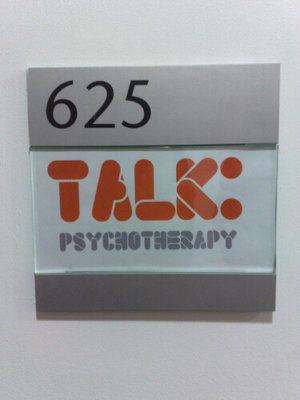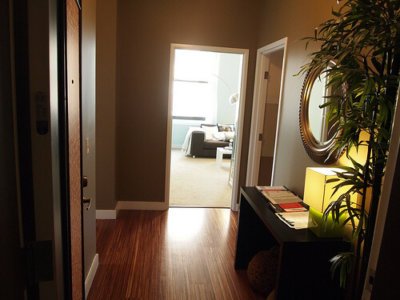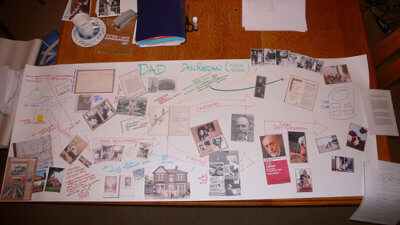What Exactly Happens in a First Therapy Session?

By: Banalities
by Andrea M. Darcy
Interested in trying therapy, but nervous as you aren’t sure what it actually involves?
Read on to learn what to expect at your very first therapy session. (And for starters, it’s rarely like what you might have seen in films or TV!).
How a first therapy session works
So what really goes on, then?
1. You arrive on time.
This really matters with therapy. Why?
If you are late, it’s highly unlikely your slot will be able to go overtime. Your therapist will have another session and client to deal with. This can mean there isn’t enough time to properly discuss your issues or see if therapy, and the therapist, are for you.
Trying online therapy? It’s still advisable to arrive at your computer a few minutes early. This lessens stress if technological issues happen.
2. Your therapist welcomes you into the therapy room (or to the online session).

By: Jaysin Trevino
Therapy has moved on since Freud.
Modern therapy very rarely consists of lying on a divan and staring at the ceiling, as your therapist says very little from behind a giant desk.
Instead, your therapist will welcome you to come in and sit (upright!) on a couch or comfortable chairs, with some friendly small talk as you settle in.
Generally you will sit relatively close to each other and facing each other.
A therapy room itself should be quiet, clean, private, and the sort of space you can relax in.
If you are doing online therapy, your therapist should still have a clutter-free background, be in a quiet private room, be using good light that you can see them clearly in, and use a good microphone. If he or she isn’t meeting these requirements, you might want to mention your preferences that they do.
3. You are asked to pay for your session (now or maybe later).
For online therapy, or phone therapy, you generally pay in advance these days. But for in-person therapy, this is up to your therapist. Some ask for it up front, others at the end of the session.

By: Joe Houghton
If your therapist doesn’t ask for your payment up front, but you feel you’d relax more if you got the payment out of the way, there is nothing to stop you from saying so.
4. The therapist asks you about what has bought you to therapy.
During a first therapy session your therapist will work to understand what it is that has bought you to seek therapy, and how he or she feels therapy can best help you.
They will ask general questions, such as:
- Is it your first time in therapy?
- What are the issues you feel you’d like to work on?
- What are you hoping to gain from therapy?
- If it’s not your first time in therapy, what other types of therapy did you try, and how did that go for you? What did you like or not like about the process?
Your therapist might also be interested in how you came across their service, and what made you feel they offer the right kind of therapy for you.
If you don’t have answers for such questions, don’t worry. It’s perfectly fine to arrive at a session with no idea what you want to say. There is something about the privacy of a therapy room and the full attention of a trained therapist that means most of us say things different to what we expect anyway.
5. You might be asked to give a brief personal history.
This actually depends on the therapeutic approach your therapist is trained in, and on their own personal way of working with clients.

By: Tim Regan
Some therapists might ask about your life history using a conversational style. Others might have a formal questionnaire they work through with you.
Things your therapist might ask you about are:
- your family
- your relationships
- your goals for yourself and your life
- big life changes
- your mental health and physical health history
- your hobbies and lifestyle.
Remember, therapy is confidential. But if you feel really uncomfortable talking about anything, it’s okay to tell the therapist so.
6. The therapist explains how sessions will work if you continue sessions with them.
Your therapist should should let you know things like the following:
- what type(s) of therapy they offer
- what the type of therapy involves (does it look at your past or just your present/future, is there ongoing homework or not, is it structured or open-ended, etc.)
- what ongoing time slots they can offer you if the one you are currently trying isn’t good for you longer term
- what their cancellation policy is
- how/if they think the type of therapy they offer might work for you.
7. You can then ask questions of the therapist in return.
You have every right to ask the therapist any question you might have about their training, qualifications, previous experience, what boards they are registered with, and if they think they can help you with your exact issues.
For more on this, see our connected article, ‘”Seeking Therapy for the First Time? Essentials You Need to Know”.
8. You discuss if it makes sense to work together.

By: John Eisenschenk
If your therapist doesn’t think the type of therapy they offer is right for you, they can give recommendations for another sort they feel would help you more.
They might even recommend you to other practitioners they feel are a better match, or even to a psychiatrist.
If the therapist wants to work with you but you are not sure about him or her, you don’t have to decide right away. You can go home and think about it.
Keep in mind that it’s entirely normal to not be sure about a therapist right away. Therapy is at heart a relationship. Much like we can take time to decide who we will be friends with, it can take 3 or 4 sessions to know if a therapist is someone we can go on to trust.
[You might find our piece, “Help! I Don’t Like My Therapist” a helpful read on this front.]
But if you are sure that he or she is not the therapist for you, that’s okay too. It can take several tries to find the right fit.
You can tell the therapist at the end of the session you won’t return. Alternately, you can call in a few days time, or send an email. Make sure you do so within the parameters of the cancellation policy, or you will be stuck paying for the next session regardless!
What you most need to know about a first therapy session
What you most need to know is that it’s okay to feel scared, uncertain, underprepared, terrified of what you will or won’t say, not sure the therapist is right for you, and/or worried if you do or don’t need therapy.
All you really need to do is put those doubts aside, book the appointment, and then show up on time. A highly trained professional therapist can take care of the rest.
Interested in trying a first therapy session? Harley Therapy connects you with experienced and registered therapists across the UK.
 Andrea M. Darcy is a mental health and wellbeing expert and mentor, with training in person-centred counselling and coaching. She runs a consultancy helping people find the right therapist and therapy for them, and preparing them for their first therapy session! Find her on Instagram @am_darcy
Andrea M. Darcy is a mental health and wellbeing expert and mentor, with training in person-centred counselling and coaching. She runs a consultancy helping people find the right therapist and therapy for them, and preparing them for their first therapy session! Find her on Instagram @am_darcy




